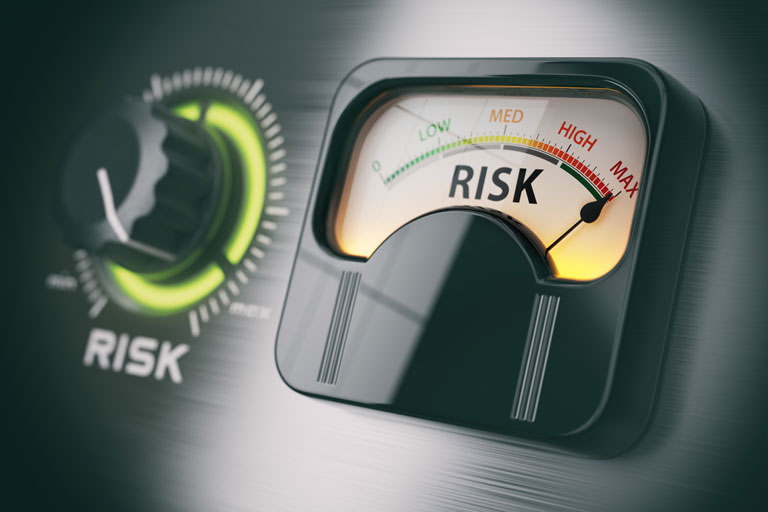Movie fans are sure to remember the 1983 teen comedy-drama Risky Business, starring a young Tom Cruise. As funny as this movie was, risky business is a term business owners don’t find comical especially when it comes to collecting payments. And as it turns out, payment processing companies don’t like that term either. Unless… it is a high-risk payment processing company.
Risk (as anyone who has ever done anything stupid knows) is the possibility of injury, peril, hazard, loss in value, or total loss. Banks and lenders have an internal process for assessing risk and determining if a business is creditworthy, for instance.
And wouldn’t you know it, but payment processors also have a similar thought process. Some high-risk payment processing industries include the following business types in no particular order, but rather arranged to form a cool-looking pyramid and will be discussed in more detail:
- Gun shops
- Credit repair
- Telemarketing
- Travel booking
- Pharmaceuticals
- Bitcoin and Forex
- Cannabis and CBD
- Subscription services
- Tobacco and e-cigarettes
- Gambling and sport betting
- Online dating and adult services
Continuing the movie theme, cash transactions can be compared to Gone with the Wind, or maybe Gone in 60 Seconds. That’s because once cash exchanges hands, what’s done is done. You may never see that customer again, even if they handed you Monopoly money, and that has happened more times than you might think.
For instance, fraudsters once paid for 500,000 pounds worth of luxury watches and other items using a cash loan from Uncle Pennybags.
A non-cash transaction, on the other hand, is a complex ecosystem involving the paying customer, the business collecting payment, and the payment processor that binds them, not to mention the banks at either end of the transaction.
As none of these parties facilitating the transaction want to be saddled with the digital form of Monopoly Money, they have created a sort of industry standard for risk management to rate and flag certain types of businesses.
What Makes For High-risk Merchant Account Payment Processing?
A payment processing high-risk red flag is applied to businesses in high-risk industries (more on that later), or those that aren’t compliant with industry-specific security regulations. Other red zone flags include doing business in countries with a high chargeback risk like Brazil and Mexico.
Sectors with high chargeback ratios and high employee turnover rates are also viewed as high-risk payment processing businesses. If you’re wondering why the work history of your employees is relevant, it’s because a high turnover rate can open the door to more identity theft.
Gray zone businesses include those that have been previously terminated by a payment processor and labeled as a Terminated Merchant File (TMF), usually due to an excessive number of chargebacks.
If your business is relatively new, with little to no payment processing or credit history, it might also have to climb out of the gray zone before proving itself. If your business has a bad credit history, which can include not providing collateral for loans in addition to not paying bills on time, it can also be flagged as a gray zone business.
If your business experiences a high volume of returns, refunds, or chargebacks comprising more than 1% of your transaction volume, your business will be in the gray zone.
The same is true of a business with a multinational footprint accepting different forms of currency.
11 Industries That Are Payment Processing High-risk

Gun Shops
Although laws vary by state, in many states, purchasing a gun is a complex process, subject to many regulatory procedures. This creates a large measure of complication for a payment processor trying to serve a national list of clients.
Laws can also change, creating further complications. All of this may leave the payment processor at risk of violating rules set forth by the Bureau of Alcohol, Tobacco, Firearms, and Explosives (ATF).
Another issue is that guns are attractive items for criminals to purchase, who may engage in so-called straw purchases: buying a legal item (guns) through illegal means (identity theft and fraud).
Credit Repair
Credit repair businesses work with financially distressed customers and clients who are rebuilding their credit, often after a bankruptcy. These individuals have already indicated that they present a higher risk for creditors.
In addition to charging for credit counseling services, some credit repair organizations may offer debt consolidation. A payment processor may be reluctant to facilitate collecting these payments because there is a greater likelihood of chargebacks or missed payments.
In fact, major payment processors like PayPal and Stripe have company policies that prevent them from working with credit repair businesses entirely.

Bitcoin and Forex
Everybody is talking about Bitcoin or one of the hundreds of other digital coins out there. The cryptocurrency market is completely unregulated (which is also one of its appeals). This can result in lots of fraudulent activity in a Wild West landscape where unprepared individuals can lose their entire wallet to 21st-century desperados.
Because cryptocurrency is also anonymous, exchanging cash for things like Bitcoin can also facilitate criminal activity. Between all the potential disputes and chargebacks and legal issues, some of which are potentially international in scope, payment processors still view the crypto industry as high-risk.
Another issue is the extreme volatility of cryptocurrencies, which fluctuate wildly in price, creating havoc with interchange fees and chargebacks as investors try to get their money back.
Telemarketing
You probably won’t find anybody who enjoys getting a telemarketing call. And although telemarketing is on the wane due to technologies like Caller ID and the Do Not Call Registry, you will still get the occasional call about some good or service you probably don’t want or need.
Also note that a new form of telemarketing has infused itself into customer service calls, where agents helping you troubleshoot an issue may review your profile and suggest other additions to improve your product usage.
Consumers who are sweet-talked into something they later regret may file a dispute or ask for a refund, leading to a plethora of chargebacks. Telemarketing calls are also sources of fraud. In fact, almost 60 million American consumers fell prey to telephone fraud schemes as recently as 2021.

Pharmaceuticals
Age restrictions, government regulations, and potential medical complications are inherent in the prescription drug business. There is also a significant ongoing drug crisis with opioids, some of which make their entry into the market through perfectly legal, prescribed purchases. Of course, there are also complications associated with medical insurance if a patient buys a prescription and then finds out it’s actually covered by their plan.
Another related market is the pseudo-pharmaceutical and nutraceutical industry, which mainly comprises supplements that are not clinically tested for safety or proven effective. Customers seeking a miracle cure and disappointed with the results may seek a refund or cancel a subscription delivery service. For all these reasons, payment processors may avoid working with pharmacies and supplements.
Travel Booking
One concern with travel booking is friendly fraud, where a consumer will book a trip, take the trip, and then claim they never made the booking. Another less malicious issue is that consumers who don’t purchase travel insurance can miss their flight or have to cancel their plans, leading them to request a refund.
Yet another issue is that most credit card transactions for travel bookings are in the card-not-present category, which means there was no physical card present; in other words, a card payment was made online or over the phone, which would classify these payment methods as high-risk online payment processing.
To make matters worse (from the risk perspective), many of the purchases are big-ticket purchases such as flights, cruises, and vacation packages that can be hundreds or thousands of dollars.

Cannabis and CBD
Only 21 states have legalized the use of marijuana for recreational purposes, a number that includes the 37 states that have legalized it for medical use. As you can imagine, this creates a complex legal and regulatory landscape that is still very young in its development.
To complicate matters further, marijuana usage (despite protestations to the contrary) has been shown in studies to create (at least) social linkage with users of other drugs, some of which are illegal.
The potential health, safety, and legal issues in this milieu present a picture of increased risk for payment processors to get involved. CBD oil and products, made from a non-psychogenic extract of the hemp plant, is another related industry that is very young and unproven in terms of long-term medical effects creating additional risk factors.
Subscription Services
Subscription services are powering consumer lifestyles today, from the entertainment of Netflix to the plethora of food-to-your-table weekly arrangements like HelloFresh. But subscription services are also subject to a high percentage of chargebacks, more so than one-off transactions.
One issue is that customers may want to cancel a service, but forget about doing that until they see it on their bank statement. They may have forgotten that their free trial is over. Occasionally, they may have insufficient funds in their checking account, even if they want to continue the service.
Their credit card number may have changed. Or, if the subscription involves a tangible physical item like a magazine or box of bespoke hand-crafted accent pieces, there may be fulfillment issues leading to customer frustration and disputed charges.

Tobacco and e-cigarettes
There was once a time when doctors thought cigarettes were healthy. Today, most consumers realize that cigarettes are decidedly unhealthy. And whether it’s true or not, many of these same consumers believe that vaping is a healthier alternative to getting a tobacco fix since they lack nicotine and some carcinogenic components.
The e-cigarette business is (similar to the cannabis industry in that it’s) a relatively new player, the implications of which are untested in terms of health and regulation. States have different laws, taxes, fines, and surcharges on tobacco products, including electronic cigarettes.
This creates a complicated payment landscape that payment processors would like to avoid, especially vis-a-vis potential future lawsuits over the long-term health complications of such products.
Online Dating and Adult Services
In recent years the popularity of dating apps has exploded, going from 241 million users worldwide in 2016 to over 324 million today. But during that same time period, romance scams also rose in popularity, costing $75 million in 2016, but a whopping $304 million as recently as 2021.
As you might guess, romance scamming involves asking for financial assistance from an admirer, usually in the form of non-traceable gift cards. And as you can also guess, this type of scam results in lots of complaints, cancellations, and refunds.
Speaking of dating and romance, another related industry is adult content, which also has its own significant risks. One of these risks is the legal complications that can result from statutory issues around age. Catfishing (pretending to be someone you’re not) may also result in disputed charges. It’s all one big emotional mess that payment processors would prefer not to get tangled up in.

Gambling and Sports Betting
Businesses that deal in gambling and sports betting, both online and in person, would be considered a payment processing high-risk account. One issue is that betting venues (digital or brick-and-mortar) have a high volume of traffic executing quick transactions.
There may also be disputes over winnings and bonuses. Sometimes a customer will dispute a charge on the basis of a larger problem, like a gambling addiction. Certainly, gambling is associated with a higher risk of criminal affiliation.
In fact, almost 70% of people addicted to gambling are criminal offenders in debt and actively looking for money to pay that off, as well as win more money. All of these concerns create a high-risk landscape rife with fraud and chargebacks.
So How Can These Types of High-risk Businesses Get Paid?
It’s no secret that our society is moving to a cashless payment model. Businesses that are flagged as high-risk accounts will need to work with a high-risk merchant service provider who is willing to work with them to accept digital payment options including accepting credit cards, debit cards, and ACH.
high-risk merchant account payment processing solutions are available to help these businesses collect high-risk credit card payments from clients and customers. Remember that these risk flags might also be related to the performance or credit history of a business, and not just the industry.
high-risk ACH payment processing companies can also facilitate high-risk ACH processing with the ACH network for businesses that would like to leverage bank-to-bank transfers. As with regular payment processors, it’s a good idea to compare high-risk processing payment processors and see which ones can offer the lowest transaction fees while providing the highest quality and most attentive level of customer service.
To contact sales, click HERE. And to learn more about ECS High-Risk Payment Processing visit High-Risk.
